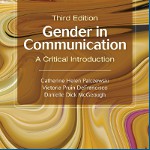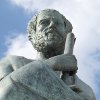In many ways, the blatantly sexist values of our ancestors endure today. Manifesting in prejudices, vulgar epithets and slurs, and even public policy, the “traditional” cultural values placing men and women into separate and unequal boxes persist. The wage-gap, no guarantee of paid maternity or paternity leave, and put-downs in the realm of “man-up” or behaving “like a girl” are examples of this age-old blatant sexism.
In other ways, sexism has evolved. Indeed, what we consider to be more modern instances of sexism tend to manifest insidiously, often going undetected and unnoticed by the untrained eye, rendering the sexist or gendered acts all the more nefarious. For example, Rape Culture reinforces a male’s privilege in society – we tell women that they need to dress modestly, to never walk alone at night, and to be careful of what they say for fear of rape all the while forgiving men’s verbal transgressions or dismissing their violent actions as “boys will be boys.”
By studying how sexism and constructions of gender operate discursively, and their varied and often subtle instantiations, Gender Critics in Rhetorical Studies reveal a myriad of truths. In addition to first revealing and articulating these instances, scholars can also trace how culture operates and how culture reifies this discourse, and also prescribe remedies to fix what ails us as a collective. In this article, we will trace the history of Gender Criticism in Rhetorical Studies, explore the practice of Gender Criticism further, feature scholars employing the method and methodology, and consider Gender Criticism’s place today.
The History of Gender Criticism in Rhetorical Studies
To better understand Gender Criticism in Rhetorical Studies, we must first, albeit too briefly, consider the larger story of gender inequality and the enduring fight for gender equality in the United States. For most of American history, a Culture of Domesticity relegated women to the home. Also called the Cult of Domesticity or the Cult of True Womanhood, this patriarchal system of values imposed upon the women of America a repressive cultural orthodoxy that demanded women be pious, pure, domestic, and submissive to their husbands.
While challenges to this Cult began in the mid-19th Century with the Seneca Falls Convention of 1848 and their Declaration of Sentiments, it wasn’t until the Progressive Era of the early 20th Century and the passage of the 19th Amendment that these challenges gained traction with the wider American public. Even then, culturally engrained gender norms stubbornly persisted.
The sexist backlash to the Women’s Suffrage Movement demonstrated the cruelty, mockery, and violence the patriarchy was willing to go to protect their power. The Second World War helped further contest gender norms as women entered the workforce and provided the arduous physical labor crucial to supporting America’s war efforts in factories and on assembly-lines. Through the determination of activists and scholars, the socio-political awakenings of the 1950’s and 1960’s then provided the right exigencies for proponents of gender equality to make their mark.
In the wake of the Women’s Movement in the late 1960’s and 1970’s, critical feminist scholarship began to take shape, eventually securing a foothold in universities and departments across the social sciences and humanities. In Rhetorical Studies, Karlyn Kohrs Campbell’s 1973 essay “The Rhetoric of Women’s Liberation: An Oxymoron” is considered an “important milestone in the evolution of feminist criticism,” which constitutes a “major element of gender criticism” (Burgchardt, 2010).
“Although this work can be profitably studied as an example of social-movement or genre criticism,” Burgchardt (2010) wrote, “it also meets the definition of feminist criticism because it analyzes gender definitions and advances feminist rhetorical theory.” Indeed, Campbell’s work in Gender Criticism (and elsewhere) constructed a solid foundation for future scholars to build upon later.
Featured Scholars Researching Gender Criticism in Rhetorical Studies
Like other forms of Rhetorical Criticism, Gender Criticism is an “exercise in argument” (Zarefsky, 2006), and, as such, the arguments a Gender Critic makes are varied in their focus and scholarly goals. The scholars listed below are, undoubtedly, some of the most talented and respected Gender Critics in Rhetorical Studies today. Indeed, their work, which is generally classified under the umbrella of Gender Criticism, serves as reminder that revealing the ways gender is communicated can take on many forms.
In addition to teaching graduate and undergraduate seminars regarding Gender in Communication, Feminist Theory, and Social Protest (among many, many others), Dr. Palczewski’s is a prolific researcher and writer. Indeed, graduate seminars in Rhetorical Studies, argumentation, and social movements will certainly feature at least one piece of her scholarship. Among Dr. Palczewski’s better-known essays is her 2005 article in the Quarterly Journal of Speech, “The Male Madonna and the Feminine Uncle Sam: Visual Argument, Icons, and Ideographs in 1909 Anti-Woman Suffrage Postcards.” Additionally, Gender in Communication (now in its 3rd Edition), co-authored with Victoria DeFrancisco and Danielle McGeough, is a widely used course book across the country.

With publications spanning the Western Journal of Communication, Women’s Studies in Communication, Communication Quarterly, and Women & Language, Dr. Gibson studies gender and the “politics of representation in legal discourse, political communication, and popular culture” (Colorado State University, n.d.). With Dr. Heyse (featured below), Dr. Gibson wrote a widely-read and highly regarded essay entitled “Depoliticizing Feminism: Frontier Mythology and Sarah Palin’s ‘The Rise of the Mama Grizzlies’” for the Western Journal of Communication.

Dr. Heyse’s wider area of research is rhetoric and public address, but her “special interests” are in political and gendered rhetoric (California State University - Long Beach, n.d.). In addition to her research on John F. Kennedy, Barack Obama, and Theodore Roosevelt, Dr. Heyse has examined the rhetoric of Sarah Palin (mentioned above), the “United Daughters of the Confederacy, and on the suppression of the woman suffrage movement.” Dr. Heyse’s teaching interests include Gender and Communication, Campaign Persuasion, and American Public Address.

Currently the chair of the Department of Communication and Rhetorical Studies at Syracuse University, Dr. Morris’ research interests in rhetoric primarily include “GLBTQ rhetorics, public memory, and social protest” (Syracuse University, n.d.). In the realm of Gender Criticism, Dr. Morris is known for taking “another approach to Gender Criticism” in his 2002 essay, “Pink Herring & The Fourth Persona: J Edgar Hoover’s Sex Crime Panic,” in which he “explores the complex connections between sexual identity and rhetoric” (Burgchardt, 2010). Additionally, Dr. Morris’ work on President Lincoln, the construction of memory, and sexual identity is profound and certainly revolutionary.

Recently selected as a Fulbright Scholar Award Recipient in India and voted in as NCA’s next 2nd Vice-President, Dr. Mandziuk’s combination of research, teaching, and service to the discipline is truly awe-inspiring. Indeed, in every aspect of her career, the study of gender in communication has remained a focal point. Dr. Mandziuk’s research intersects rhetoric, history, and depictions of women, with her research winning awards at NCA, SSCA, and at Texas State University. For her prowess as an instructor, Dr. Mandziuk has received four Presidential Distinction Awards for Excellence in Teaching as well as the Multicultural and Gender Studies Faculty Member of the Year Award at Texas State University.

Dr. Lewis’ research “examines U.S. women’s activism in the suffrage movement and leadership in political office during the progressive era” (Baruch College, n.d.). In addition to her forthcoming book Uprising: How Women Used the U.S. West to Win the Right to Vote, Dr. Lewis’ work can be found in Rhetoric & Public Affairs, Women’s Studies in Communication, Western Journal of Communication, and Advances in the History of Rhetoric. Dr. Lewis is also a board member for the Organization for Research on Women and Communication and serves on the editorial board for the Recovering Democracy Archive: Speech Recovery Project.
Exploring Gender Criticism Further
With larger historical and academic contexts serving as a backdrop, scholars and consumers of American Culture can more fully explore the form Gender Criticism in Rhetorical Studies typically takes, and the impact it has on the cultural consciousness. By and large, Gender Criticism “analyzes how the symbolic interactions of particular cultures define, inculcate (teach), and impose performances of femininity and/or masculinity” (Burgchardt, 2010). In other words, Gender Critics are concerned with the ways in which cultures wield symbols (language and images) to describe and demarcate gender roles, and to also instruct people on how to perform these roles while also disciplining those who may venture outside the established norm.
For example, a Gender Critic in Rhetorical Studies could examine how toy commercials gender code their products to sell to children. Indeed, a Gender Critic could argue that, taking cues from existing social norms, toys designed for little girls are typically featured abundantly in pink and purple, reinforce our culture’s beauty standards, and can also reify work deemed acceptable for women – like house and kitchen work. Toys designed for little boys, on the other hand, are featured in red or blue, emphasize work outside the home, and can reinforce violence.
In examining the confluence of gendered symbols and discourse in children’s television commercials, this critic could trace the history of gendered toys in America, discuss the implications of gendering toys, examine communicative instances when children or parents challenge this norm, and could also provide remedies to help society move away from this practice.
Elsewhere, a Gender Critic in Rhetorical Studies could examine gender as it is communicated discursively in the public realm. Indeed, the #MeToo Movement, the revitalized debate over the Equal Rights Amendment, and the 2017 (and subsequent) Women’s Marches provide ample opportunity for both burgeoning and more established Gender Critics to probe the ways in which gender impacts communication.
Gender Criticism Today
More and more, scholars across the social sciences and humanities continue to contribute important research supporting the notion that gender is indeed a social construct. In other words, while our biology certainly plays a role in the development of our identity, society and communication foster, reify, and can alter perceptions of ourselves and the intricacies of our identities.
Despite the wealth of research linking gender to society, culture, and communication, many refuse to surrender the traditionalist cultural values of our ancestors. Indeed, the backlash to the introduction of modern concepts of gender has been swift and aggressive, simultaneously obvious though sometimes well-veiled. One instance of this backlash is transphobia – or the fear of transsexual individuals.
Because transphobia’s roots run deep in American history and culture – its manifestations can be linked to social, ideological, political, and religious intolerance – Contemporary Gender Critics in Rhetorical Studies continue to probe transphobia’s various discursive manifestations to reveal the communicative nuances at work. For example, Leland Spencer (2019) examined the use of memes as a response to the various “bathroom bills” passed by several states in 2016 and 2017. While some memes were created to oppose these bills, Spencer (2019) found that some of the more viral memes relied upon overt transphobia to support what many considered to be transphobic legislation.
The crucial scholarship of Gender Critics reverberates outside the academy as well. More and more, discourse regarding gender, identity, and performance continues to manifest in the larger public, allowing for people outside of journal articles and books to critique traditional constructions of gender and shape a more holistic approach to identity in the 21st Century.
For example, 2020 Democratic Presidential candidate Elizabeth Warren faced a curiously aggressive wave of attacks for dancing at one of her campaign rallies. Much of the criticism contained incredibly gendered undertones – and fellow contender for the nomination, Cory Booker, tweeted a defense of Warren, pointedly asking people to “Raise their hand if you know why people are trolling Elizabeth’s dance moves and not my dad jokes.”
While seemingly a fleeting and unimportant moment on the campaign trail, the aggressive criticism of a female candidate for president is, unfortunately, the norm rather than the exception in American politics. Booker’s twitter defense of his colleague is noteworthy in that it is indicative of a larger conversational change happening in America, where, more and more, we are becoming aware of gender and how it is communicated today.
In all, Gender Criticism in Rhetorical Studies continues to produce work crucial to understanding how gender is communicated today. Students looking to further study and apply Gender Criticism in their own work are encouraged to continue reading the many journals featuring this crucial work, and to also continue to attend the many conferences affiliated with the discipline.
Sources and Additional Resources
To learn more about the field of gender criticism in rhetorical studies, check out the following resources:
- Baruch College. (n.d.). Tiffany Lewis—School of Public Affairs—Baruch College | CUNY. Retrieved from https://www.baruch.cuny.edu/profiles/faculty/Tiffany-Lewis
- Burgchardt, C. R. (2010). Readings in Rhetorical Criticism (Fourth). Strata Pub.
- Colorado State University. (n.d.). Katie Gibson—College of Liberal Arts. Retrieved from https://www.libarts.colostate.edu/people/klgibson/
- Gibson, K. L., & Heyse, A. L. (2014). Depoliticizing Feminism: Frontier Mythology and Sarah Palin’s “The Rise of The Mama Grizzlies.” Western Journal of Communication, 78(1), 97–117. https://www.tandfonline.com/doi/abs/10.1080/10570314.2013.812744
- Spencer, L. G. (2019). Bathroom Bills, Memes, and a Biopolitics of Trans Disposability. Western Journal of Communication, 83(5), 542–559. https://www.tandfonline.com/doi/full/10.1080/10570314.2019.1615635
- Syracuse University. (n.d.). Charles E. Morris III. Retrieved from College of Visual and Performing Arts website: https://vpa.syracuse.edu/faculty-staff/morris-iii-charles-1/
- Zarefsky, D. (2006). Reflections on Rhetorical Criticism. Rhetoric Review, 25(4), 383–387. Retrieved from https://www.jstor.org/stable/20176744
Additional Topics on Research in Rhetorical Studies

This guide provides an in-depth discussion of rhetorical studies, describing the history and significance of the discipline while also providing readers with theories that are useful to understanding different forms of rhetoric and their functions in human communication.

This article discusses the field of critical rhetoric and its importance in the examination and exposure of power dynamics in society. It also provides information on key scholars in the field who study how rhetoric connects to equality, politics, and cultural values.

This article provides an overview of genre criticism in rhetorical studies, and how it has evolved over the centuries. It also explains the influential work of scholars in this field of study.

This article explores scholarly approaches to understanding persuasion as material. Explore how scholars have attempted to understand rhetorical discourse as a material thing, and, on the other hand, how material things, like monuments and roads, can be politically persuasive.

This article explains how metaphors are widely used in human communication and understanding, and provides a background on the history and prominent scholarship of this field.

This article covers narrative criticism and the role it plays in culture, politics, and relationships, while also providing examples of prominent scholarship in this field.

Learn about scholarly efforts to understand how communities come to share perceptions about the past and explore the different rhetorical strategies employed in constructing public memory, from monuments to new media.

This article examines the history and impact of social movement rhetorical research, and provides readers with a detailed overview of some of the latest research in the field that is being completed by eminent scholars of social justice and civil rights rhetoric.


